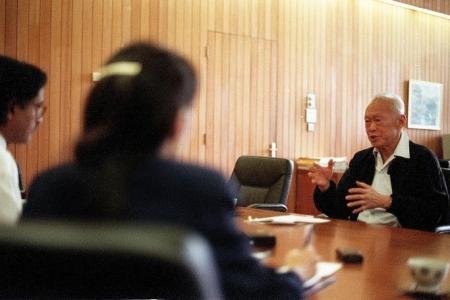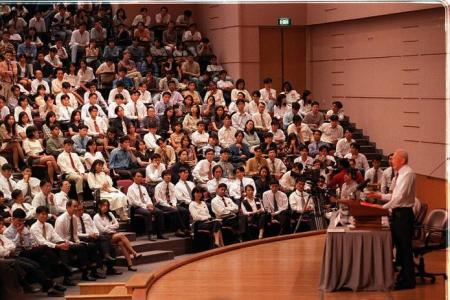Over to you now, young Singaporeans
Throughout his life, Mr Lee Kuan Yew's concern for the younger generation never slackened
COMMENTARY by IRENE NG
Ms Irene Ng has been a Member of Parliament for Tampines GRC since 2001, and was a journalist with The New Paper and The Straits Times for 15 years before that.
The night before a heart operation, Mr Lee Kuan Yew refused to rest.
He felt it was more important to be talking to young Singaporeans about the future of the country and their role in it.
So that was what he did on March 14, 1996.
For more than 2½ hours, he was on his feet in full flow, engaging about 1,700 undergraduates at the Nanyang Technological University (NTU).
Using his wealth of political experience and wit, he exhorted them to learn from the mistakes he had observed abroad, and to back leaders who would take the long-term decisions needed to prevent Singapore from becoming just another slow-growing developed country.
Meanwhile, his wife, Mrs Lee, who sat in a front row seat, was beside herself with worry.
Her face was etched with concern as she watched him go on for an hour longer than scheduled.
Earlier, she had tried to persuade Mr Lee, who was then Senior Minister and 73, to put off the forum at the NTU.
A devoted wife, she wanted to minimise all risks for Mr Lee, who had a blockage in his coronary artery.
The next day, he was due to undergo balloon angioplasty to insert a stent - his second heart operation in two months, after an earlier procedure to widen the artery failed to work.
But Mr Lee insisted on keeping his date with the young Singaporeans.
Driven by his strong sense of mission, he wanted to help them understand how the country got to where it was and how to avoid the pitfalls that troubled other advanced countries.
As he said later: "They have grown up in a time of growing security and comfort and, by the time they learnt the pitfalls, it may be too late. So, why not try to lessen it?"
Throughout his life, his concern for the younger generation never slackened.
On the contrary, it grew stronger in the face of his old age and certain mortality.
MY ENCOUNTERS WITH MR LEE
I first met Mr Lee in the early 1990s, when I was leading the political coverage for The New Paper as its senior political correspondent. He was almost 70, and I about 30.
Over lunches with him at the Istana, usually together with one or two other younger journalists, we reflected the critical views of our vocal young to him, and their aspirations for a better life.
They wanted more political choices and freedom.
While Mr Lee understood these desires, he could not help but despair occasionally at the young's preoccupations with narrow immediate wants and their lack of historical perspective.
With his charisma and charm, he sought to influence us by persuasion rather than by imposing his will.
He was keen to get us to understand the vulnerabilities of Singapore and challenge us to embrace the possibilities of the future with the same gumption as his generation did.
From observing him over the years, I found that there were several issues close to his heart when it came to the young.
KEEPING A DIVERSE PEOPLE UNITED
One which would draw his impassioned response was the Singapore Pledge.
And by impassioned, I mean tears springing to his eyes, his voice choking with emotion, the painful pregnant pause.
As he put it once, when he was a young man in his 20s, his Singapore Dream was embodied in the ideals of the Pledge, to build "a united people, regardless of race, language and religion".
He and his colleagues had pursued that dream with a resolute spirit, despite the trials and tribulations, the defeats and disappointments, the fears and the jeers.
The memory of the struggles to uphold these ideals in the aftermath of the communal riots in 1964 remained raw for Mr Lee for the rest of his life.
He harboured fears that, with peace and harmony, young people might be lulled into thinking that such communal fault lines have disappeared. "It will be a grave mistake to believe that these dangerous primeval forces, driven by religious and racial feelings, cannot erupt again. If we ever forget this, we put our future in peril," he warned.
He was equally anxious that the young would cherish the multiracial creed as their own Singapore Dream, and to uphold its ideals in their own lives.
While Singapore must adapt to the times, some basic principles must never change, he stressed. These included adequate representation of all races in Parliament, and recruitment to all jobs based on merit, regardless of race or religion.
QUALITY OF POLITICAL LEADERS MORE IMPORTANT
Another of Mr Lee's constant themes to the young was on the politics of this country.
When tackling this topic, his high brow would crease into a frown, and his piercing eyes flash, ready for debate.
The essence of his conviction is summed up in his advice to the undergraduates in 1996: "The political factor, that is the nature and quality of leadership, is more decisive for the fortunes of a country than the economic factors."
To keep Singapore on the high road of progress in an increasingly competitive world, the country needed leaders who could take the hard decisions with short-term pain for long-term benefits.
So, choose strong, able and honest leaders who can do this, and back their policies, he urged.
His generation, he said, had done its share, putting in place a clean and effective system, and men of ability and integrity.
Then came his mantra: It is now up to you, the younger generation.
WERE HIS SACRIFICES WORTH IT?
When he decided to engage the young on the eve of his heart surgery, Mrs Lee could not help but ask him if his taking such a risk was worthwhile. Why work so hard? Would the young people appreciate it?
This was a question that could also be asked legitimately of his many other sacrifices throughout the years.
An answer to that can be found in the hordes of young people who thronged to pay tribute to Mr Lee after his death.
Moved by his example, many came forward with a new conviction to do their part to serve Singapore. Over the weeks after his death, many more have signed up as volunteers.
Their response was a testament to their character, and also Mr Lee's legacy.
In his death, his life became an inspiration to the young.
As one young woman wrote in the condolence book: "Mr Lee, I will always look up to you and try to live my life like you with fierce conviction, commitment and discipline. Thank you for showing us how to do it."
Get The New Paper on your phone with the free TNP app. Download from the Apple App Store or Google Play Store now




